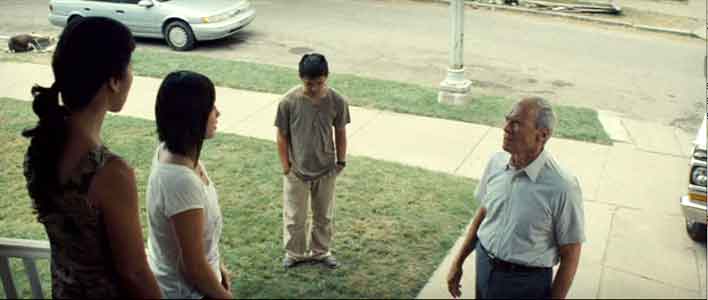
Walt Kowalsky’s sister and mother want him to take Thao under his wing.

Walt Kowalsky’s sister and mother want him to take Thao under his wing.
Walt Kowalsky (Clint Eastwood) is retired auto worker who lives in an older area of Detroit. In his lifetime he fought actual combat in the Korean War, married his sweetheart, worked at the Ford plant, and raised a family. Walt has lived the American dream but in many ways it has passed him by and left him bitter. He still is haunted by flashbacks of his war experiences. When the young priest Father Janovich (Christopher Carley) at his local Catholic church wants to talk to him about life and death matters, Walt tells him that the true horror of war is not what you were ordered to do, but what you did on your own. That is when he is not telling the priest to buzz off because he is not religious at all like his wife was and thinks that Father Janovich knows nothing about real life. As the movie opens, we are at the church where they are having the funeral services for Walt’s wife of countless years, and clearly the one person who kept him stable all these years. Walt is estranged from the rest of his family. He is not close with his two sons, their wives, or his grandchildren. Walt is very old school and independent, while his sons see him as an anachronism and encourage him to simplify his life by moving into a retirement home. Walt resents the fact that his family sees him as no longer capable of managing his own affairs. He doesn’t say a word but you can see just by his look that he is very offended that his four grandchildren do not come dressed up properly to their grandmother’s funeral. At the reception after the funeral at Walt’s house, his oldest granddaughter (Dreama Walker) who is dressed with bare midriff showing and several body piercings bluntly asks him what he is going to do with his prized vintage car, a 1972 Gran Torino that he actually helped build, when he dies. She also has a shopping list of items in the house that she would like when she goes off to college next year. Needless to say, Walt does not take well to these kinds of questions. For Walt, it is a matter of respect, although when it comes to anyone else he shows very little respect and is not shy about verbalizing it. He classes all people by their race or color, and freely uses the most degrading language to describe them. They are micks, and dagos, chinks, and gooks, colored boys (I’m sure that the studio had Walt use this term instead of what the real Walt would have said) and pollacks. With his good old boy friends, this is the way they talk about each other and take care of business. To everyone else it is a reminder that they are not totally accepted in this country and should stick to their own kind. Walt’s house is like a last bastion of white America in a neighborhood now occupied by immigrant families, most of them Hmung from Laos, Cambodia, and Viet Nam. His property is his sacred castle and he has no qualms about sticking a gun in your face and ordering you off, should you dare to trespass. Walt has health issues also, although you would never guess it from his life style, freeing chugging beers, and smoking and chewing tobacco. But lately he has begun to spit up blood. When he finally goes to see a doctor, and of course asks where his regular doctor is, instead of the Chinese doctor who attends to him, the test results aren’t good. He tries to tell his oldest son Mitch (Brian Haley) about it, but calls at a bad time, and when Mitch is a little impatient with him on the telephone, Walt decides not to tell him about his medical problems.
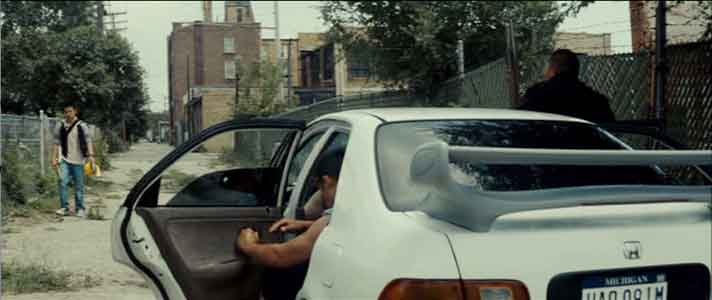
Local gang members harass Thao so that he will join their gang.
The main story line of Gran Torino unfolds when his new Hmung neighbors, the Lors, move in next door. There are several generations represented, the grandmother (Chee Thao), the mother Vu (Brooke Chia Thao), a teenaged son Thao (Bee Vang) and older daughter Sue (Ahney Her). There is a great scene where the grandmother and Walt eye each other on their front porches with dirty looks on their faces. “She doesn’t like me and I don’t like her,” is Walt’s line, and then you see both of them spit out chewing tobacco in disgust. The real action centers around the brother and sister of the younger generation. A local gang, led by Thao’s cousin, wants to recruit him into the gang. One day they grab him and tell him that to belong he must prove his loyalty by stealing Walt’s car. Thao really doesn’t want to, but under pressure breaks into Walt’s garage. Inept in life and as a thief, he is quickly discovered by Walt, who goes after him with a rifle, but Thao is able to escape when he pushes the gun away and Walt trips and misfires. He then runs away. Now both Walt and the gang are after him. The next day, after the gang comes over to the Lor house to give Thao “another chance” to join, there is a melee as the family and neighbors try to fight off the gang from grabbing Thao again. Walt comes out with his rifle and drives the gang members off. With this one deed, Walt suddenly becomes a neighborhood hero. Soon his front steps are overflowing with gifts of food and flowers from the neighborhood. Walt is embarrassed by all of this attention, but it puts him on a path to begin understanding his neighbors and the Hmung culture. Sue, who is intelligent and spirited, make a point to getting to know Walt and invites him to a family barbecue and party. She introduces him around, and despite breaking just about every cultural taboo when he first visits them, he starts to connect with them. When a Hmung shaman reads him and tells him that he has an unhappy life, Walt begins to realize that he has more in common with his Hmung neighbors than he does with his own family. In another development, Vu and Sue bring Thao over to Walt because he has brought shame on the family for trying to steal the Gran Torino. Thao must work two weeks for Walt, doing whatever he asks as his penance. At this point, the two start to bond, and Walt ends up taking Thao under his wing, and shows him how to behave in order to succeed in America. Walt still uses his racist language and put downs, but now it is in a more friendly way, like when he talks to his drinking buddies. Meanwhile, the gang want to get its revenge on the Lor family for resisting them and fighting back. As incidents of violence escalate, Walt and the Lors begin to realize that until the gang is somehow prevented from interfering with their lives, they will always be in danger. How this is resolved makes up the balance of the film.
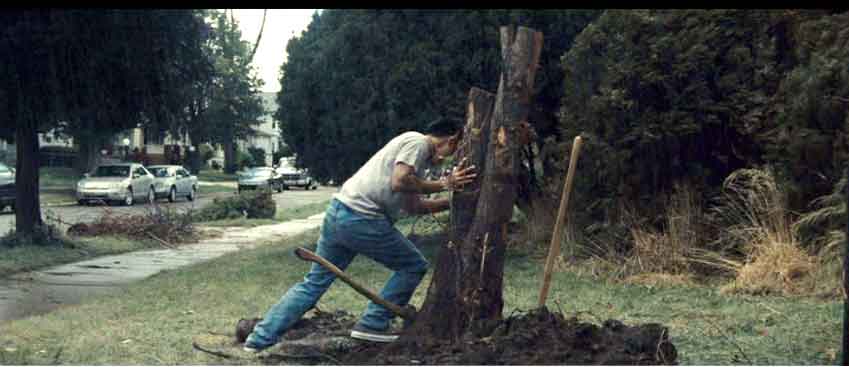
Thao has to work hard in the neighborhood to make up for trying to steal the Gran Torino.
Gran Torino is notable because it brings back Clint Eastwood not only as a director but also as an actor in a starring role. When you look at this film, you realize that only Clint Eastwood could pull this role off. How many other 78 year old men do you know who could go on screen and seem just as menacing today as Eastwood was thirty years ago when the Dirty Harry movies were released. And who else could pull off the lines he says? Anyone else spewing out the continual racist chatter that makes up a lot of his dialogue would be viewed as an out of control bigot, but with Eastwood delivering the lines, it reminds you of someone you might know and somehow seems totally believable. And you bond with his character despite what he says! When he looks you in the eye and says. “Get off my lawn!” it seems no different than Harry Callahan telling some criminal scumbag “Make my day!” And the hand gestures he does to simulate a gun: the finger points, his thumb goes back to chamber the round, and then “bang” with his thumb and forefinger. Who else could pull that off in front of a bunch of gangbangers these days? When he tells a gang member, “I could blow a hole in your face and sleep like a baby,” everyone watching is thinking, “I wish I could say something like that in a crisis.” It seems so realistic because Eastwood always presents himself on camera warts and all. There is not a lot of makeup or attempt to make him an attractive looking hero on screen. This has to be one of Clint Eastwood’s five best performances of his career. In a way, it sums up the genre and persona Clint Eastwood has built up for himself throughout his career. In the theater, when it came to the final set of scenes, the tension was palpable, you could have heard a pin drop, and there wasn’t a dry eye in the house. It doesn’t matter that the story line is a little too pat. It does have some nice twists to the plot, however, that keep you guessing how it ultimately resolves itself. Bee Vang and Ahney Her put in fine performances as Walt’s young neighbors. Throughout the production you are aware of Eastwood’s hand in the mix. Gran Torino is another one in his series of films that deal with violence in our society and how people choose to react to it. If you are a Clint Eastwood fan, this film is a must see.
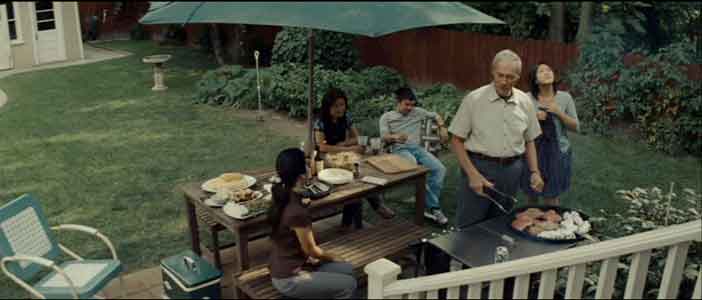
Walt ends up becoming friends with his neighbors.
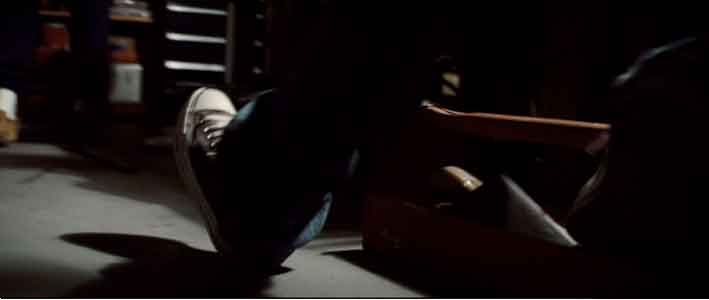
Thao gets ready to run when Walt discovers him trying to steal his Gran Torino.
Bee Vang in his role as Thao, the wayward Hmung son trying to figure out how to become successful in America wears black low cut chucks in many of his scenes. There are not a lot of good close ups. Probably the best scene, and it goes by very quickly, is when Thao breaks into Walt’s garage to steal his Gran Torino.
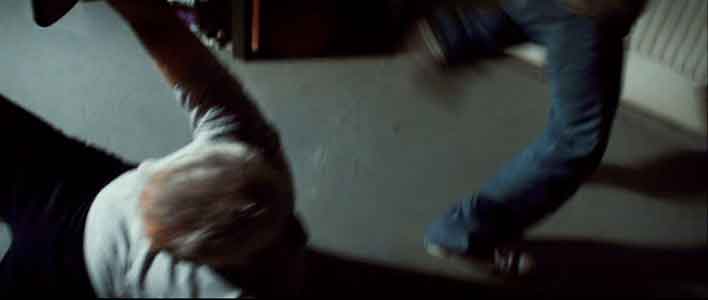
Thao is running away as Walt trips and falls down.
Gran Torino. (2009) Clint Eastwood, Christopher Carley, Bee Vang, Ahney Her, Brian Haley, Geraldine Hughes, Dreama Walker, Brian Howe, John Carroll Lynch, William Hill, Brooke Chia Thao, Chee Thao, Choua Kue, Scott Eastwood, Xia Soua Chang.
Directed by Clint Eastwood. Categories: Action/Adventure, Drama.
ChucksConnection Rating: ![]() MPAA Rating: R
MPAA Rating: R
Support the film industry by purchasing genuine DVD, Blue Ray, or streaming copies of these films. Illegal copies only help profiteers. Make sure your money goes to the producers and artists who actually create these films. Still images from the film are used here as teasers to get you to view an authorized copy. If you have information about a film where a main character wears chucks, contact us at films@chucksconnection.com. |